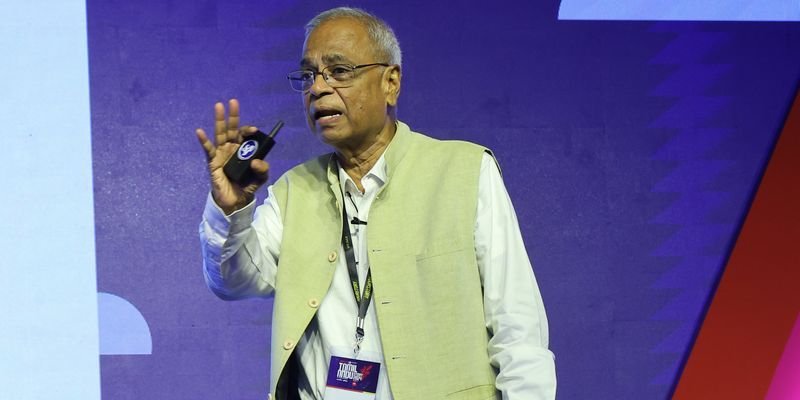[ad_1]
“We need to solve our problems in a unique manner. If we do (so), we can solve similar problems globally,” said Ashok Jhunjhunwala, Institute Professor, IIT Madras.
Speaking at Tamil Nadu Story 2024, YourStory’s flagship event in the state, Jhunjhunwala emphasised the need to focus on large-scale national problems and solve them uniquely.
To illustrate this, he cited the challenges of improving the efficiency of heating and cooling systems in homes and industries, which account for a significant portion of energy consumption and greenhouse gas emissions.
“India has the lowest telephony and internet connection costs. No one else is doing it,” he said, highlighting India’s innovative approach to making technology affordable.
He also discussed future innovations such as autonomous public transportation and personalised energy-efficient buildings.
India’s progress over the years
India has undergone significant changes in the past three decades. From a time when basic amenities and technological infrastructure were scarce, India has now emerged as a global leader in various sectors, including IT services, space technology, and pharmaceuticals.
“Despite this progress, many households still struggle with outdated systems and infrastructure, posing challenges and opportunities for technological leadership,” Jhunjhunwala said.
After studying at the University of Maine, USA, Jhunjhunwala returned to in India in 1981.
He said, “When I came to India, 50% of the graduates were engineers,” underlining the educational challenges of that time.
He vividly remembered the struggles to make telephones accessible to everyone, reducing their cost from Rs 40,000 to Rs 10,000—a feat achieved in the 1990s.
This revolution in telecommunications was a turning point in India’s growth story, said Jhunjhunwala.
Leveraging young talent and education
Jhunjhunwala also pointed out the significant improvements in education over the years.
“Even in the 1980s, there were a lot of problems in education. But let’s look at the positives,” he said.
Today, India is producing millions of engineering graduates annually. However, he stressed the need for education to focus on practical application rather than just theoretical knowledge.
“Many youngsters focus on publishing papers rather than solving practical problems,” he remarked, urging a shift towards real-world applications.
The professor also highlighted the importance of collaboration between academia and industry.
“We brought together academia and industry around 2000-2005 to clean up the certified roster,” he said.
This collaboration led to the incubation of startups that are now integral to India’s growth story.
“We did not take money from the government or the industry; we actually borrowed money from the bank,” Jhunjhunwala stated, reflecting the self-sustaining model that many startups adopted.
Addressing the issue of brain drain, Jhunjhunwala noted, “Today, less than 10% of IIT graduates go abroad.”
He also pointed out that many top talents from Tier II and III cities prefer to work in India, contributing to the nation’s growth.
“People who are going abroad are not necessarily the brightest. Many prefer to work here,” he added, suggesting that India has ample talent to drive technological and economic progress.
[ad_2]
Source link





